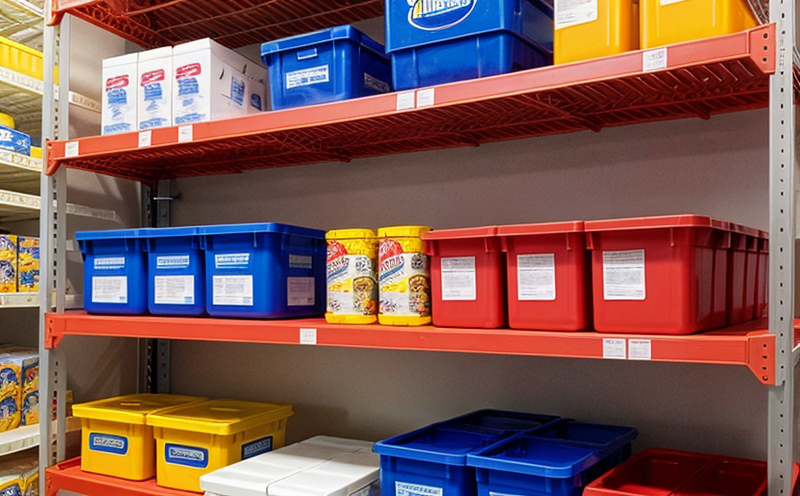ISO 112705 Shelf Life Analysis in Cereal-Based Meals
The shelf life of cereal-based meals is a critical parameter that impacts both consumer satisfaction and regulatory compliance. The ISO 112705 standard provides a robust framework for determining the shelf life of these products, ensuring they remain safe, nutritious, and palatable until their expiry date. This service involves a series of comprehensive tests designed to evaluate the stability of cereal-based meals under various storage conditions.
The process begins with the selection of representative samples from batch production lines. These samples undergo rigorous physical and chemical analyses aimed at identifying potential degradation factors such as moisture content, fat oxidation, protein denaturation, and microbiological contamination. The testing protocol is designed to align closely with ISO 112705 guidelines, which emphasize the importance of accurate sample preparation and precise measurement techniques.
Once samples are prepared, they undergo a battery of tests including:
- Moisture Content: Determined using gravimetric methods to ensure no adverse changes in texture or flavor due to moisture gain or loss.
- Fat Oxidation: Assessed via thiobarbituric acid (TBARS) testing, which helps identify rancidity and its potential impact on shelf life.
- Protein Denaturation: Detected through UV-Vis spectroscopy to monitor changes in protein structure over time.
- Microbiological Stability: Evaluated using standard plate counts and ATP testing to ensure the product remains safe for consumption.
The results of these tests are collated into a detailed report, providing insights into the optimal storage conditions required to maintain shelf life. This information is invaluable for quality managers and R&D engineers looking to optimize production processes and extend the shelf life of their products.
By adhering to ISO 112705 standards, laboratories ensure that they are delivering accurate and reliable data, which can significantly enhance a company's reputation in terms of product safety and reliability. Compliance with these standards also facilitates easier market access and reduces the risk of regulatory challenges.
Why It Matters
Ensuring the shelf life of cereal-based meals is not just about extending consumer satisfaction; it's a matter of public health. Inadequate shelf life management can lead to foodborne illnesses, waste, and financial losses for manufacturers. Shelf life testing helps identify potential issues early in the production process, allowing companies to make informed decisions that improve product quality.
For compliance officers, meeting regulatory requirements is paramount. ISO 112705 provides a clear path to ensure products meet international standards. This not only simplifies compliance but also enhances trust among consumers and other stakeholders. For R&D engineers, this service offers valuable insights into how different storage conditions can affect product stability, aiding in the development of more robust formulations.
The importance of shelf life testing cannot be overstated. It ensures that products remain safe, nutritious, and enjoyable throughout their shelf life. This is particularly crucial for cereal-based meals, which are often consumed by vulnerable populations such as children and elderly individuals. By providing accurate data on shelf life, this service plays a vital role in maintaining public health standards.
Customer Impact and Satisfaction
The impact of accurate shelf life testing extends beyond compliance; it directly influences customer satisfaction and loyalty. Consumers expect products to be safe, fresh, and enjoyable when they reach the store shelves or their homes. By extending shelf life through robust testing, companies can meet these expectations, leading to higher levels of customer satisfaction.
Moreover, this service helps manufacturers avoid costly recalls and product withdrawals, which can damage brand reputation and lead to significant financial losses. By ensuring that products remain safe and palatable until the expiry date, companies can build strong relationships with their customers, fostering long-term loyalty.
The insights gained from shelf life testing also play a crucial role in enhancing customer confidence. When consumers see that a product has been rigorously tested and meets international standards like ISO 112705, they are more likely to trust the brand. This trust can translate into repeat purchases and positive word-of-mouth recommendations.
Environmental and Sustainability Contributions
- Reduced Waste: By optimizing shelf life through accurate testing, companies can minimize waste by ensuring products are consumed before their expiry date.
- Energy Efficiency: Extended shelf life allows for more efficient use of resources, as fewer raw materials need to be used to replace wasted products.
- Resource Conservation: By reducing the frequency of production runs and batch sizes, this service contributes to overall resource conservation efforts.
- Social Responsibility: Ensuring product safety and quality helps protect vulnerable populations who rely on such products for nutrition.
The commitment to sustainability in shelf life testing aligns with global initiatives aimed at reducing food waste and promoting responsible consumption. By offering this service, we contribute to a more sustainable future by ensuring that every gram of cereal-based meal is used efficiently and effectively.





